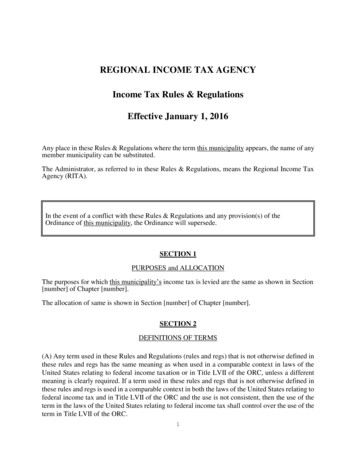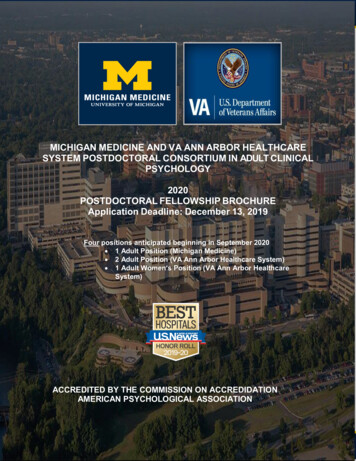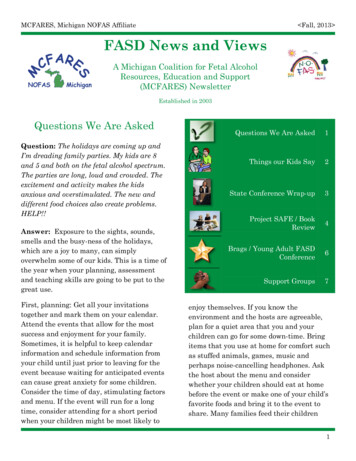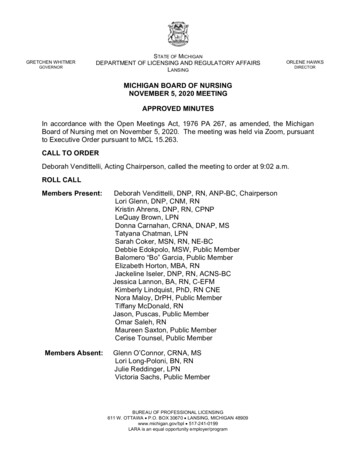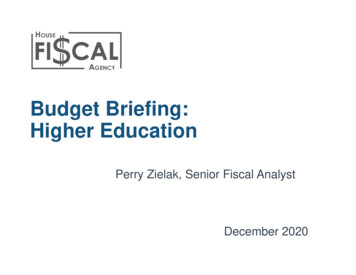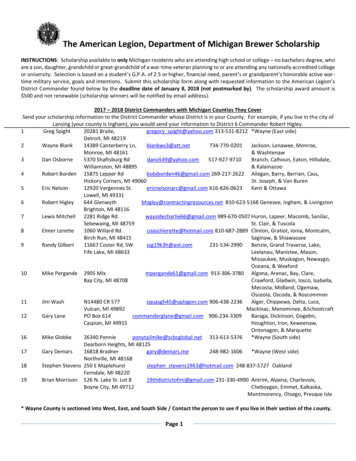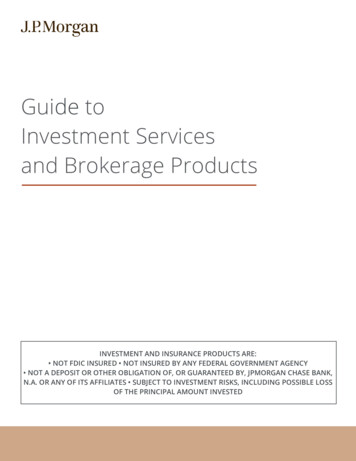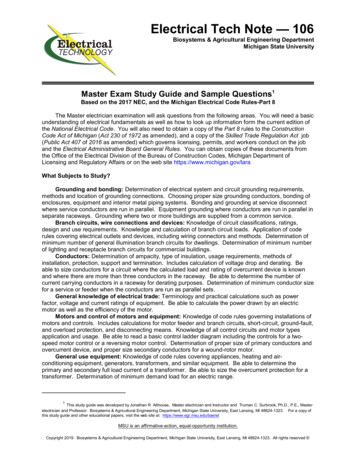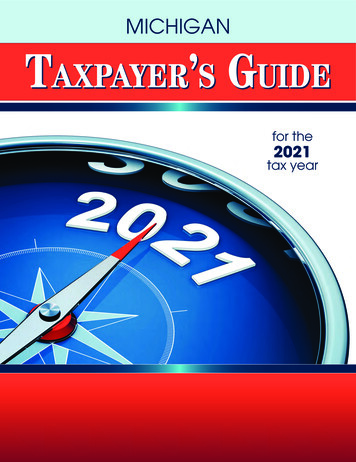
Transcription
MICHIGANTAXPAYER’S GUIDEfor the2021tax year
Dear Taxpayer:This booklet contains information for your 2022 Michigan property taxes and 2021 individualincome taxes, homestead property tax credits, farmland and open space tax relief, and the homeheating credit program.For the 2021 income tax returns, the individual income tax rate for Michigan taxpayers is4.25 percent, and the personal exemption is 4,900 for each taxpayer and dependent. An additionalpersonal exemption is available if you are the parent of a stillborn child in 2021. The state alsoprovides a 2,800 special exemption for each tax filer or dependent in the household who is deaf,paraplegic, quadriplegic, hemiplegic, totally and permanently disabled or blind. An additional 400 exemption is available for each disabled veteran in the household.This year, federal and state income tax returns are due April 18, 2022. Most taxpayers mayrequest that their income tax refund be directly deposited into a U.S. financial account of theirchoice. To request direct deposit, fill out the direct deposit portion of the MI-1040, MI-1040CR, orMI-1040CR-2 or file Form 3174 and attach it to the state income tax form.The information contained in this booklet may ease the burden of filling out state tax formsand may even save some taxpayers money. However, this booklet is not designed to provideline-by-line instructions for filling out state income tax forms. Please refer to the MichiganDepartment of Treasury’s income tax instruction booklets for line-by-line guidance.Please Note:The tax forms have been included as an example for taxpayers. Anyone using theseforms to file their state income tax and property tax credits should consult thedepartment’s instruction booklets. Any references on these forms to page numbersrefer to pages in the department’s instruction booklets and not to pages in thisTaxpayer’s Guide.
TABLE OF CONTENTSMichigan Property Tax . . . . . . . . . . . . . . . . . . . . . . . . . . . . . . . . . . . . .Property Tax Assessment . . . . . . . . . . . . . . . . . . . . . . . . . . . . . . . . .Appealing a Tax Assessment . . . . . . . . . . . . . . . . . . . . . . . . . . . . . .Property Tax Rates . . . . . . . . . . . . . . . . . . . . . . . . . . . . . . . . . . . . . .Collection . . . . . . . . . . . . . . . . . . . . . . . . . . . . . . . . . . . . . . . . . . . . .Tax Deferments . . . . . . . . . . . . . . . . . . . . . . . . . . . . . . . . . . . . . . . . .Significant 2022 Property Tax Dates . . . . . . . . . . . . . . . . . . . . . . . .Michigan Individual Income Tax . . . . . . . . . . . . . . . . . . . . . . . . . . . . .Tax Information for Tax Year 2021 . . . . . . . . . . . . . . . . . . . . . . . . .State Income Tax Exemptions . . . . . . . . . . . . . . . . . . . . . . . . . . .Additions and Subtractions . . . . . . . . . . . . . . . . . . . . . . . . . . . . . .Tax Calculation . . . . . . . . . . . . . . . . . . . . . . . . . . . . . . . . . . . . . . .State Income Tax Credits . . . . . . . . . . . . . . . . . . . . . . . . . . . . . . . . .Homestead Property Tax Credit . . . . . . . . . . . . . . . . . . . . . . . . .Examples of Computing the Credit . . . . . . . . . . . . . . . . . . . . .Filing the Homestead Property Tax Credit . . . . . . . . . . . . . . .Home Heating Credits . . . . . . . . . . . . . . . . . . . . . . . . . . . . . . . . .Standard Method . . . . . . . . . . . . . . . . . . . . . . . . . . . . . . . . . . . .Alternative Method . . . . . . . . . . . . . . . . . . . . . . . . . . . . . . . . .Receiving the Home Heating Credit . . . . . . . . . . . . . . . . . . . .Earned Income Tax Credits . . . . . . . . . . . . . . . . . . . . . . . . . . . . .Farmland Preservation Tax Credit . . . . . . . . . . . . . . . . . . . . . . . .Voluntary Contributions Schedule . . . . . . . . . . . . . . . . . . . . . . . .Filing Income Tax Returns . . . . . . . . . . . . . . . . . . . . . . . . . . . . . . . .2021 Individual Income Tax FormsIndividual Income Tax . . . . . . . . . . . . . . . . . . . . . . . . . . . . . . . . . . .Schedule 1 . . . . . . . . . . . . . . . . . . . . . . . . . . . . . . . . . . . . . . . . . . . . .Pension ScheduleVoluntary Contributions ScheduleHomestead Property Tax Credit . . . . . . . . . . . . . . . . . . . . . . . . . . . .Homestead Property Tax Credit for Veterans and Blind People . . .Farmland Preservation Tax Credit . . . . . . . . . . . . . . . . . . . . . . . . . .Home Heating Credit . . . . . . . . . . . . . . . . . . . . . . . . . . . . . . . . . . . .11344458888991013131414151516161617424650524856
The assistance of theMichigan Depart ment of Treasuryis acknowledged for its role inthe preparation of this publication.This information is provided free toMichigan citizens and is not for resale or profit.Prepared by theMichigan LegislatureJanuary 2022
A TAXPAYER’S GUIDEMICHIGAN PROPERTY TAXThe general property tax has traditionally been an important part of our state’s tax structure. Moneyraised through property taxes goes toward financing local services, such as police and fire protection;public education; the operation of city, village, township, and county governments; and special projectssuch as sewers, streets, and parks. All property taxes collected by local units of government, other thanthe state education tax which is sent to the state School Aid Fund for distribution, are kept locally, and noother part of that revenue is sent to or used by the state.PROPERTY TAX ASSESSMENTProperty subject to taxation by local units of government is classified as either real or personal property.Real property consists of land and any improvements to the land, such as buildings and water and sewerfacilities. Personal property includes tangible items such as furniture, machines, and equipment belongingto a business, and those items not permanently attached to land or buildings. Generally, residential personalproperty is exempt from taxation.The process for determining a property owner’s tax bill begins with calculating the property’s assessedvalue. The “assessed value” of real property is the value placed upon the property by the local assessmentofficer. There are three valuations used in assessing real property in Michigan: assessed value, stateequalized value, and taxable value. The Michigan Constitution requires that property be assessed uniformlyat a rate not to exceed 50 percent of true cash value. True cash value is the usual selling price that theproperty would bring on the local market.Property assessment is an annual, three-step process. First, the local assessor determines the assessed value of property based on the condition of theproperty on December 31 of the previous year. This is 50 percent of what the assessor determinesto be the market price. If the property is covered by a conservation easement, the local assessormay take the easement into account in determining the assessed value. Conservation easements arevoluntary restrictions on future development on the property. Second, the board of commissioners in each county equalizes, or applies an adjustment factor, toensure that property owners in all cities, townships, villages, or school districts in the county paytheir fair share of that unit’s taxes. Equalization serves to bring the total valuation across assessingunits as close to the 50 percent level as possible. Third, the State Tax Commission applies an adjustment factor to the county assessments to bring thetotal valuation across counties as close to the 50 percent level as possible. This process produces theproperty’s state equalized value, or SEV.While equalization results in the determination of the property’s state equalized value, the taxable valueis what is used to calculate property taxes. For newly acquired property, the SEV is the property’s taxablevalue. For each continued year of ownership, taxable value is the lesser of that year’s SEV versus theprevious year’s taxable value minus losses, adjusted for inflation, plus new property improvements. In otherwords, any increase in taxable value from one year to the next is capped at the rate of inflation or 5 percent,whichever is less, except for new construction. The inflation rate used to calculate 2022 taxable values is3.3 percent.When a property is transferred, the cycle starts anew, and the following year’s SEV becomes theproperty’s taxable value, eliminating the cap of the rate of inflation or 5 percent. This often triggers a“pop-up” in taxes due. A transfer of ownership occurs when a title or present interest in the property istransferred through conveyance by deed, land contract, trust, distribution under a will, certain leases, or othermechanisms. Transfers of property from one spouse to the other or from a decedent to a surviving spouse,among other exceptions, are not considered a transfer of ownership. In addition, transfers of residentialproperty to an immediate family member are exempted from the pop-up if the property is not used for anycommercial purpose following conveyance.1
A TAXPAYER’S GUIDEThe pop-up from taxable value to SEV does not apply when eligible farmland is transferred to newowners. When someone purchases eligible farmland and files an affidavit testifying that the property willremain in agricultural use for at least seven years, the transfer will not trigger the pop-up. Transfers of landsubject to a conservation easement are also exempted from the pop-up.PRINCIPAL RESIDENCE EXEMPTIONA principal residence is exempt from taxes levied by a local school district for operating purposes of upto 18 mills. A homeowner’s principal residence is defined as “the one place where an owner of the propertyhas his or her true, fixed, and permanent home to which, whenever absent, he or she intends to returnand that shall continue as a principal residence until another principal residence is established.” Propertyowners may claim only one exemption. A married couple, filing income tax returns jointly, are generallyentitled to no more than one principal residence exemption. However, there are exceptions to these rules.The law allows a temporary, additional exemption for up to three years on an unoccupied homesteadlisted for sale. Homeowners with a principal residence exemption currently residing in a nursing home,assisted living facility, or other location while convalescing and members of the armed services absent onactive duty may maintain the exemption so long as they continue to own and maintain the property, theydo not establish a new primary residence, and the property is not used for most commercial and businesspurposes. A homeowner who vacates their home because of damage or destruction may maintain theexemption for up to three years as long as they demonstrate an intent to move back in.To be eligible for the homeowner’s principal residence property exemption, a taxpayer must file anaffidavit with the local tax collecting unit on or before June 1 for an exemption from the immediatelysucceeding summer tax levy and November 1 for an exemption from the immediately succeeding wintertax levy. Once filed, exemptions are valid in future years until rescinded. A denial of this exemption maybe appealed to the Michigan Tax Tribunal. The appeal must be filed within 35 days from date of notice.FARMLAND (QUALIFIED AGRICULTURAL) PROPERTY EXEMPTIONFarmland may be exempt from taxes levied by a local school district for operating purposes of up to18 mills. Farmland must be determined to be qualified agricultural property. The state has defined qualifiedagricultural property as “unoccupied property and related buildings classified as agricultural, or otherunoccupied property and related buildings located on that property devoted primarily to agricultural use.” Ifa property is classified as agricultural for assessment purposes, a property owner does not need to take anyaction to receive the exemption, unless requested by the local assessor. Otherwise, a property owner mustclaim an exemption by filing an affidavit with the local tax collecting unit on or before May 1. In somecases, a partial exemption may be approved if part of the property is used for non-agricultural purposes.An exemption remains in place unless withdrawn or until rescinded. A denial of an exemption may beappealed to the local board of review. A board of review decision may be appealed to the Michigan TaxTribunal within 35 days from the decision.POVERTY EXEMPTIONA person may be eligible to request a poverty exemption from property taxes if they, at a minimum,own and occupy the property as their homestead, demonstrate evidence of ownership and identification,and meet poverty income standards. The local board of review makes the determination if the exemptionshould be granted or denied based on the guidelines for both income and asset levels adopted by the localunit of government. To be eligible for an exemption, a homeowner must apply to the local assessing unitafter January 1 but before the day prior to the last day of the board of review. In certain jurisdictions,where permitted by resolution of the local governmental unit, a person who received the exemptionin 2019, 2020, or both, or was approved for the first time in 2021, and receives a fixed income from publicassistance may receive the exemption for up to 3 additional years without reapplication. March board ofreview denials may be appealed to the Michigan Tax Tribunal by the end of July. July and December boardof review denials must be appealed to the Michigan Tax Tribunal within 35 days of notice.2
A TAXPAYER’S GUIDEDISABLED VETERANS EXEMPTIONProperty owned and used as a homestead by a disabled and honorably discharged veteran is exempt fromMichigan property taxes. To be eligible for this exemption, a disabled veteran must be determined by the U.S.Department of Veterans Affairs to be permanently or totally disabled as a result of military service and entitledto veterans’ benefits at the 100% rate, have a certificate from the U.S. Veterans Administration certifyingthat they are receiving or have received pecuniary assistance due to disability for special adaptive housing,or be rated by the U.S Department of Veterans Affairs as individually unemployable. This exemption is alsoavailable to an unremarried surviving spouse of a disabled veteran. An affidavit to qualify for this exemptionmust be filed annually with the local tax unit. A claim for the exemption is reviewed by the local board ofreview. A board of review decision may be appealed to the Michigan Tax Tribunal.FARMLAND DEVELOPMENT RIGHTS AGREEMENT OR EASEMENT EXEMPTIONProperty owners who own farmland covered by a development rights agreement or easement with thestate are exempt from special assessments for sanitary sewers, water, lights, and nonfarm drainage on landcovered by the agreement or easement. The exemption does not apply to assessments in place prior to enteringinto an agreement or easement. In addition, the property owner cannot take advantage of the services financedthrough the assessment on the exempted land and may be required to pay the assessment if the agreement oreasement is ended.APPEALING A TAX ASSESSMENTTHE LOCAL BOARD OF REVIEWIf, for any reason, a taxpayer disagrees with the assessed value, taxable value, or taxable status ofproperty, he or she may appeal to the local board of review. Each city or township may have its own boardof review or appoint a joint board of review with neighboring communities. Township boards of review arecomprised of three, six, or nine voters who are appointed by the township board. The size, composition,and appointment of city boards of review vary according to requirements of their respective city charters.Boards of review meet in the week containing the second Monday in March to hear protests. Boards ofreview also meet in July and December to correct qualified errors in the roll, including adjustments forproperty incorrectly listed as having had a transfer of ownership or certain other errors regarding the taxablestatus of the property. These meeting dates are also used for disputes over claims for the homeowner’spoverty exemption, disabled veterans status, and initial farmland property exemptions. Boards of review mayretroactively award a principal residence exemption to a homeowner for property not exempted on the taxroll; however, denied principal residence exemptions are appealed directly to the Michigan Tax Tribunal,which must be filed within 35 days of denial. Corrections may be made for the year in which the appealwas filed and, in some cases, for the three immediately preceding years. Places and times of board of reviewmeetings should be posted in the local newspaper.THE MICHIGAN TAX TRIBUNALTo make an appeal at the state level, a taxpayer must have first locally appealed an assessment ofresidential or agricultural property. If not satisfied with the judgment of the board of review, a taxpayermay appeal the decision to the Michigan Tax Tribunal, an independent body which has the power to hearappeals of judgments of the local boards of review. (Assessment classifications are appealed to the State TaxCommission.) The tribunal has seven members appointed by the Governor and confirmed by the MichiganSenate. To appeal a 2022 assessment to the Michigan Tax Tribunal, an appeal must be filed before August 2,2022 for residential or agricultural property and before June 1, 2022 for other property.The Residential and Small Claims Division of the Michigan Tax Tribunal hears appeals of valuationof residential and agricultural property and appeals of agricultural and homeowner’s principal residenceexemptions. An appeal must be filed within 35 days after the assessor, county treasurer, or county equalizationdirector denies a claim for an exemption. An appeal of a claim for a poverty exemption must be filed byJuly 31, if the claim was denied at the March board of review. A claim must be filed within 35 days if theJuly or December board of review (meetings held to correct errors in the roll) denies a claim of exemption.3
A TAXPAYER’S GUIDEA filling fee may be required for an appeal. There is no fee for the filing of an appeal of a povertyexemption denial or contesting a property’s SEV or taxable value if the property is covered by a principalresidence exemption of at least 50 percent. The fees for filing other property tax appeals vary dependingon the type of appeal and the amount of SEV or taxable value in contention, whichever is greater, with aminimum of 25.00.To initiate an appeal to the Michigan Tax Tribunal, the property owner must file a petition with theTribunal’s Small Claims Division. Petition forms can be found on the Michigan Tax Tribunal’s SmallClaims Division website, . As of March 1, 2013, theTribunal no longer accepts letters to initiate appeals.PROPERTY TAX RATESThe tax rate, or millage, is the number of tax dollars the taxpayer must pay for each 1,000 of taxablevalue. This rate varies by local unit, but certain statewide constitutional and statutory restrictions exist. Therate may not exceed 15 mills ( 15 per 1,000), split between a taxpayer’s county, township, and schooldistricts, except in counties in which voters have approved rates of up to 18 mills. Excluded from theselimitations are: Debt service taxes for all debts of local units approved by the electorate; For general law counties, townships and school districts, extra-voted millage rates up to 50 millsnot to exceed 20 years; and Taxes imposed by those units having tax limitations provided by charter or general law (cities,villages, charter townships, charter counties, community colleges, intermediate school districts (forspecial education and vocational education mills only) and other charter authorities).Property taxes can be determined by multiplying the total local millage rate by the taxable value ofproperty. A mill equals one one-thousandth of a dollar ( 1 of tax for each 1,000 of taxable value). Forexample, if the local millage rate is 32 mills ( 32 per 1,000 of taxable value) and the taxable value is 100,000, the formula would be 32 x 100, for a property tax of 3,200. The Michigan Department ofTreasury has a property tax estimator on its website, sp.COLLECTIONProperty taxes may be collected in the summer or the winter, or in some combination. Townshipstraditionally collect property taxes in the winter, but most cities collect property taxes in the summer. Thesix-mill state education tax is collected in the summer. School boards or intermediate school districts canrequest that a city or township collect half or all of their school taxes in the summer. County-allocatedmillages are collected in the summer and county extra-voted millages are collected in the winter.TAX DEFERMENTSThere are several instances in which a taxpayer may have their payments for special assessments orsummer or winter property taxes deferred.SPECIAL ASSESSMENTSA homeowner who is 65 years of age or older or who is totally and permanently disabled, and who isa citizen of the United States, a resident of this state for five or more years, the sole owner of a homesteadfor five or more years, and who meets household income standards, is eligible to defer special assessmentson that homestead that, per 2020 PA 331, were assessed before October 1, 2020. The total amount of thespecial assessment to be deferred, exclusive of interest, cannot be less than 300.4
A TAXPAYER’S GUIDEFor those who qualify for a special assessment deferment, the payment of the deferred specialassessment by the owner, or the owner’s estate, will include an interest charge of 1 percent per month orfraction of a month. Special assessments will be deferred until one year after the owner’s death or untilthe homestead is sold, conveyed, or transferred to someone else. Death of a spouse, however, will notterminate the deferment for the surviving spouse, unless the surviving spouse remarries.SUMMER PROPERTY TAXA taxpayer who is 62 years of age or older (including the unremarried surviving spouse of a personwho was 62 years of age or older at the time of death), a paraplegic, a quadriplegic, a hemiplegic, aneligible serviceperson, an eligible veteran, an eligible widow or widower, or who is totally and permanentlydisabled or blind may be able to delay paying summer taxes on his or her homestead if total householdincome in the prior taxable year did not exceed 40,000. Summer taxes on farms may also be deferredin certain situations where gross receipts in previous years are not less than household income in thepreceding calendar year. If deferred, summer taxes may be paid on or before February 14 without anypenalty or interest. Applications for deferment of summer taxes must be filed with the city, village, ortownship treasurer by September 14, or before the date summer taxes are due, whichever is later.WINTER PROPERTY TAXA taxpayer who is 65 years of age or older (including the unremarried surviving spouse of a personwho was 65 years of age or older at the time of death), a paraplegic, a quadriplegic, a hemiplegic, aneligible serviceperson, an eligible veteran, an eligible widow, or who is totally and permanently disabled orblind may be able to delay paying the winter taxes on his or her homestead, without penalty, until May 1of the first year of delinquency. Winter tax deferral is only available if approved by the county board ofcommissioners and is subject to certain conditions. Taxpayers can contact the county treasurer to determineif the winter tax deferment is available and to check qualifications.SIGNIFICANT 2022 PROPERTY TAX DATESDecember 31, 2021 Tax day for 2022 property tax assessments.February 14, 2022 Last day to pay property taxes without the imposition of a late penalty charge equal to 3 percent ofthe tax in addition to the property tax administration fee, if any. The governing body may waive the penalty for the homestead property of a senior citizen (62 yearsof age or older), paraplegic, quadriplegic, hemiplegic, eligible service person, eligible veteran, eligiblewidow or widower, or totally and permanently disabled or blind person, if that person has filed aclaim for a homestead property tax credit with the state treasurer before February 15. Also applies toa person whose property is subject to a farmland/development rights agreement if they present a copyof the development rights agreement or verification that the property is subject to the developmentrights agreement before February 15. If statements are not mailed by December 31, the local unit maynot impose the 3 percent late penalty charge. A local unit of government shall defer the collection of summer property tax until this date forproperty which qualifies.February 28Last day for local treasurers to collect 2021 property taxes.March 1Properties with delinquent 2020 taxes forfeit to the county treasurer. County property tax administration fee of 4 percent added to unpaid 2021 taxes and interest at1 percent per month. Local units to turn over 2021 delinquent taxes on real property to the county treasurer.5
A TAXPAYER’S GUIDESIGNIFICANT 2022 PROPERTY TAX DATES (CONTINUED)March 14 The local board of review meets. This meeting must start not earlier than 9 a.m. and not later than3 p.m. The board of review must meet one additional day during this week and shall hold at leastthree hours of its required sessions during this week after 6 p.m. Note: The governing body of a city or township may authorize March 15 or 16 as an alternativestarting date for the initial meeting of the March board of review.April 1 Last day to pay all forfeited 2019 delinquent property taxes, interest, penalties and fees, unless anextension has been granted by the circuit court. If unpaid, title to properties foreclosed for 2018 realproperty taxes vests solely in the foreclosing governmental unit.April 4 The March board of review must complete their review of protests of assessed value, taxable value,property classification, or denial by assessor of continuation of Qualified Agricultural PropertyExemption.April 29 Last day of deferral period for winter (December 1) property tax levies, if the deferral for qualifiedtaxpayers was authorized by the county board of commissioners. Deadline for filing the Farmland (Qualified Agricultural) Property Exemption affidavit (Form 2599)with the local assessor if the property is NOT classified agricultural or if the assessor asks an ownerto file it to determine whether the property includes structures that are not exempt.May 1 Deadline for filing a Principal Residence Exemption Active Duty Military affidavit (Form 4660)to allow military personnel to retain an exemption for up to three years if they rent or lease theirprincipal residence while away on active duty.May 31 Appeals of property classified as commercial real, industrial real, developmental real, commercialpersonal, industrial personal, or utility personal must be made by filing a written petition with theMichigan Tax Tribunal.June 1 Last day to send first notice to all properties that are delinquent on 2021 taxes. Deadline for filing Homeowner’s Principal Residence Exemption affidavit (Form 2368) forexemption from the summer tax levy of 18-mill school operating tax. Deadline for filing the initial request (first year) of a Conditional Rescission of Principal ResidenceExemption (Form 4640) for the summer tax levy. Note: Denial of a Homeowner’s Principal Residence Exemption may be appealed by the ownerto the Small Claims Division of the Michigan Tax Tribunal within 35 days after the date of thenotice of denial.June 6 Deadline for notifying protesting taxpayer in writing of board of review action.June 30July 1 Deadline for classification appeals to the State Tax Commission. A classification appeal must be filedwith the state tax commission in writing on or before June 30 (Form 2167). Taxes due and payable in those jurisdictions authorized to levy a summer tax. (Charter units may havea different due date.)July 19 The July board of review may be convened to correct a qualified error. Note: The governing body of a city or township may authorize, by adoption of an ordinance orresolution, an alternative date during this week. For taxes levied after December 31, 2012, an owner who owned and occupied a principal residenceon June 1 or November 1 for which the exemption was not on the tax roll may file an appeal with theJuly board of review in the year for which the exemption was claimed or in the immediate succeedingthree years if the exemption was not on the tax roll. An owner of property that is Qualified Agricultural Property on May 1 may appeal to the July board ofreview for the current year and the immediately preceding year if the exemption was not on the tax roll. July board of review may hear appeals for current year only for poverty exemptions, but not povertyexemptions denied by the March board of review.6
A TAXPAYER’S GUIDESIGNIF
assisted living facility, or other location while convalescing and members of the armed services absent on active duty may maintain the exemption so long as they continue to own and maintain the property, they do not establish a new primary residence, and the propert
